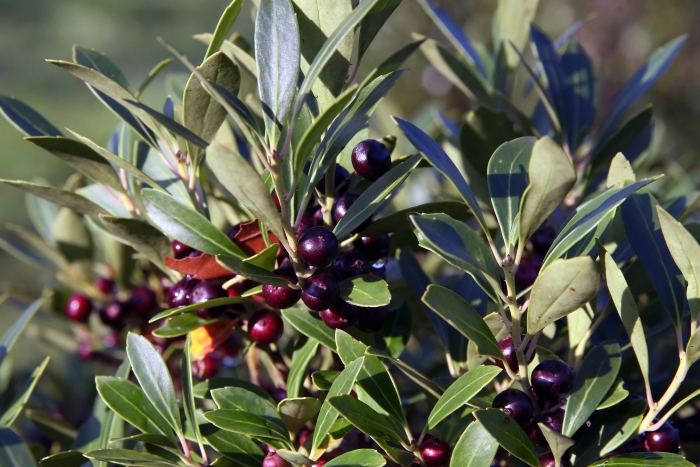Inkberry
(Ilex glabra)
Inkberry (Ilex glabra)
/
/

Photo by David J. Stang
CC BY-SA 4.0
Image By:
Photo by David J. Stang
Recorded By:
Copyright:
CC BY-SA 4.0
Copyright Notice:
Photo by: Photo by David J. Stang | License Type: CC BY-SA 4.0 | License URL: https://creativecommons.org/licenses/by-sa/4.0 | Uploader: David Stang | Publisher: Wikimedia Commons | Title: Ilex_glabra_Squat_1zz.jpg | Notes: Uploaded own work with UploadWizard |











































































Estimated Native Range
Summary
Ilex glabra, commonly known as Inkberry, is an evergreen shrub native to the coastal plains and wetlands of eastern North America, extending from coastal Nova Scotia to Florida and west to Louisiana. It is typically found in moist, acidic soils of pine barrens, bogs, and swamp margins, often forming dense thickets. Ilex glabra typically matures to 5–8 ft (1.5–2.4 m) tall with a similar spread and can spread by root suckers to form colonies. Its dense, rounded form features dark green, leathery leaves and small, white, inconspicuous flowers in late spring to early summer, followed by black, berry-like drupes that persist into winter and are attractive to birds.
Inkberry is valued for its evergreen foliage, which provides year-round interest, and its adaptability to wet conditions, making it suitable for rain gardens and naturalized areas. It is commonly used in residential and commercial landscapes for foundation plantings, hedges, and mass plantings. Inkberry thrives in full sun to part shade and prefers acidic, moist to wet soils with good drainage. It is tolerant of salt spray and can be used in coastal landscapes. While generally low-maintenance, it can suffer from leaf drop if planted in too dry or alkaline soils, and it may be prone to leaf spot and tar spot. Pruning is recommended to maintain a tidy appearance and to control spread.CC BY-SA 4.0
Inkberry is valued for its evergreen foliage, which provides year-round interest, and its adaptability to wet conditions, making it suitable for rain gardens and naturalized areas. It is commonly used in residential and commercial landscapes for foundation plantings, hedges, and mass plantings. Inkberry thrives in full sun to part shade and prefers acidic, moist to wet soils with good drainage. It is tolerant of salt spray and can be used in coastal landscapes. While generally low-maintenance, it can suffer from leaf drop if planted in too dry or alkaline soils, and it may be prone to leaf spot and tar spot. Pruning is recommended to maintain a tidy appearance and to control spread.CC BY-SA 4.0
Plant Description
- Plant Type: Shrub
- Height: 5-8 feet
- Width: 5-8 feet
- Growth Rate: Slow
- Flower Color: N/A
- Flowering Season: Spring
- Leaf Retention: Evergreen
Growth Requirements
- Sun: Full Sun, Part Shade
- Water: Medium
- Drainage: Fast, Medium, Slow
Common Uses
Bee Garden, Bird Garden, Border Plant, Butterfly Garden, Deer Resistant, Erosion Control, Hedges, Low Maintenance, Rabbit Resistant, Salt Tolerant, Street Planting
Natural Habitat
Moist, acidic soils of pine barrens, bogs, and swamp margins
Other Names
Common Names: Appalachian Tea, Bitter Gallberry, Dye-Leaves, Evergreen Winterberry, Gallberry, Houx Glabre
Scientific Names: , Ilex glabra, Prinos glaber, Ilex glabra f. leucocarpa, Ilex glabra var. austrina, Ennepta myricoides, Winterlia glabra, Winterlia triflora,
GBIF Accepted Name: Ilex glabra (L.) A.Gray